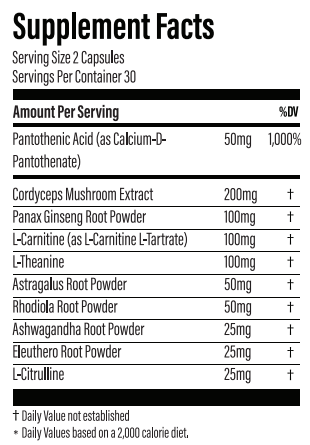Deep Dive: Adrenal Energy Ingredients
So, what ingredients make Adrenal Energy? Allow me to break down each, including their relevance to thyroid disease, mechanisms of action, and a review of supporting research.
Cordyceps
Cordyceps sinensis is a fungus related to dietary mushrooms. Historically, it has been used as an energy tonic throughout Asia since the earliest recorded medical records.
Cordyceps has been proven to improve energy by:
- Lowering thyroid antibodies
- Reducing inflammation
- Increasing endogenous antioxidant capacity
- Increasing glycogen storage
- Improving immune regulation1
In a study of energy levels in adults aged 50-75, participants consumed cordyceps or a placebo for 12 weeks.
Exercise performance measured by metabolic threshold increased by over 10% and by ventilatory threshold over 8% in those taking Cordyceps.
They were able to generate more energy than before due to the effects of cordyceps.2
Panax Ginseng
Panax ginseng is a root extract that has been used to improve energy levels. Studies show it can reduce oxidative stress and improve mitochondrial function in skeletal muscle tissue.
In a recent analysis of over 140 studies, researchers concluded that:
“Ginseng is a promising treatment for fatigue. Both American and Asian ginseng may be viable treatments for fatigue in people with chronic illness”3
In multiple double-blind placebo studies, participants with fatigue given ginseng were shown to improve energy levels over those who received placebo. In many cases, the fatigue scores improved within 15 days of starting ginseng and decreased by dramatic amounts.
L-Carnitine
L-Carnitine is a naturally-occurring amino acid that is essential for mitochondrial energy production. In optimal health, our bodies produce it in adequate amounts.
When L-Carnitine is low, fatty acids cannot be brought across the cell membranes to enter the mitochondria and therefore cannot be used to produce energy. In chronic conditions such as thyroid disease, L-Carnitine metabolism can be impaired.4
Clinical trials have shown that supplementation with L-Carnitine can improve symptoms of mental fatigue in those with thyroid disease.
In a representative study, 60 people with hypothyroidism and significant levels of fatigue were given L-Carnitine or a placebo. The treatment lasted for 12 weeks. By the end of the 12 weeks, participants noticed clear improvements in fatigue severity, physical fatigue, and mental fatigue.
Subgroup analysis showed that those who had prior thyroidectomies noticed the most dramatic energy improvements from L-Carnitine.5
Other studies have shown that L-Carnitine can lower fatigue post exercise, prevent age-associated muscle loss6, and improve mitochondrial function.7
L-Theanine
L-Theanine is a naturally-occurring non-protein amino acid. It is found in foods like tea and some mushrooms.
In supplement form, theanine has been shown to improve cognitive function and reduce mental fatigue. It improves alpha wave activity of the brain and can have neuroprotective effects against chronic stress.
In a representative study, 30 adults received theanine tablets or a placebo over a four week period. Most subjects were female and the average age was 48.3 years. Numerous tests of mood, cognitive performance, and sleep quality were performed.
Depression, anxiety, sleep quality, and cognitive function scores all improved in those taking theanine. Verbal fluency also showed a marked improvement.
Pantothenic Acid
Pantothenic acid, also known as vitamin B5, is a nutrient that is required for the production of energy from fats and carbohydrates. It is also necessary for the regulation of adrenal hormones including cortisol, and DHEA.8
In vitro studies have shown that pantothenic acid supplementation can improve the adrenal glands’ responsiveness to ACTH.9
Astragalus
Astragalus membranaceus is a yellow-to-tan root used in traditional Chinese medicine. Historically, it was given for numerous conditions including chronic fatigue, kidney disease, and weakened immunity.
In a double-blind placebo-controlled study, astragalus was given to patients with severe fatigue post stroke. Those receiving astragalus showed improvements in energy levels, quality of life symptoms, and mental function.10
The researchers concluded that:
“These findings suggest that [Astragalus] can ameliorate [fatigue] and improve quality of life, especially cognitive function. . . and social function.”
Rhodiola
Rhodiola Rosea is a plant from arctic and Northern European regions that has a long history of being used as an adaptogen.
It has been shown to improve salivary cortisol levels, mental work capacity, and measures of fatigue.11
Studies have shown that the benefits of Rhodiola can manifest in those with fatigue secondary to chronic diseases and those with fatigue from normal life activities.
In a representative study, 100 subjects with prolonged fatigue symptoms used Rhodiola for 8 weeks. Many participants were noticing clear improvements to fatigue within the first week. These benefits continued to improve throughout of the study. None had adverse effects from Rhodiola.12
Other studies have shown that Rhodiola may improve the powers of attention and lower symptoms of depression.13
Withania
Withania Somnifera (Ashwagandha) is an herbal tonic from Ayurvedic medicine. Whereas some tonics may produce side effects of overstimulation, Withania is not prone to. Not only that but it often lowers symptoms of agitation and anxiety while raising energy levels.
A recent double blind placebo controlled study showed the regular use of Withania led to improved regulation of cortisol and lower symptoms of chronic stress.14
In addition to benefits with adrenal function, human studies show that Withania may help thyroid function.
A recent clinical trial showed that patients prone to thyroid disease who were taking Withania experienced increases in their thyroid hormone output.15
Eleutherococcus
Eleutherococcus senticosus (Siberian Ginseng) is the root of an Asian plant with a long history of use as an adaptogen and energy tonic. It is known to act as an antioxidant, immune tonic and a blood sugar regulator.
In a review of multiple studies, eleutherococcus has been shown to regulate the output of adrenal hormones in chronic stress conditions and improve parasympathetic response. It has also been shown to improve energy metabolism and biological responses to hypoxia.16
In a recent placebo controlled blinded human clinical trial, 87 participants were selected to evaluate the effects of eleutherococcus on chronic stress. Compared to those on placebo, those receiving eleutherococcus showed improvements in surveys regarding symptoms of fatigue and depression.17
L-Citrulline
L-Citrulline (Citrulline malate) is an amino acid that has been shown to improve exercise capacity of males and females. It is converted by the kidneys into L-arginine and nitric oxide.
When nitric oxide levels increase, blood flow to muscles improves, raising physical energy and recovery from activity.
In older adults, supplementing with L-citrulline was shown to improve physical performance and the breakdown from fat more than high-intensity interval training (HIIT) alone.18
In a study on L-Citrulline and female strength, female athletes took L-Citrulline or placebo on two separate occasions. Those supplementing with L-Citrulline showed more upper body and lower body strength without increased exertion as measured by heart rate. They were able to generate more energy without pushing themselves harder.19












